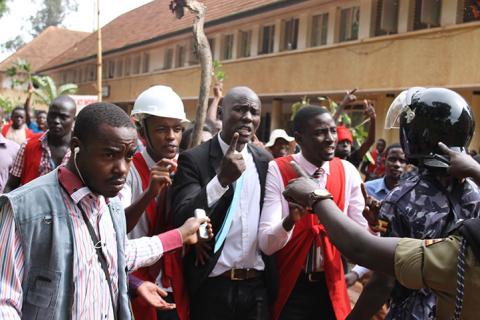Makerere's New Fees Policy In Fresh Criticism, Students Demand Accountability For Fines
Submitted by Christopher Tusiime on

As a result of frequent strikes at Uganda's premier institution of higher learning, Makerere University council came up with a new tuition policy that is currently being popularised by GRCs and the University bursar at college levels. JANET LABAK has been looking at how the policy is being adopted.
The policy was officially approved by the Makerere university council on July 13 after consultation with some student leaders and the prime minister, Dr Ruhakana Rugunda.
However, despite the confidence that it would be a lasting remedy to the frequent strikes, some students still feel uncomfortable with it.
According to this policy, students are supposed to pay Shs 200,000 within the first three weeks of every semester. This amount is part of the tuition fees, and not a separate charge.
Those who fail to pay this money in that period are liable to a sur charge of Shs 20,000, while those that pay after the twelfth week are fined 5 per cent of the fees balance at the time of payment. For late registration with the university, that is after the tenth week, also calls for a fine of Shs 50,000.
The university council also extended the deadline for paying all the tuition fees from the sixth week to the twelfth week of each semester.
Now, to some students, all those make the policy still undesirable. For Daniel Ocan, a first-year student of Ethics and Human Rights, there is nothing to celebrate about the policy yet.
“This policy is very harsh. Money has become very scarce, and not everyone is able to get fees within the stipulated time,” he lamented.
For Allan Mwesigwa a fourth-year Journalism student, the policy is still unrealistic and students need to be accorded more time to pay their tuition.
The other major concerns of the students are the fines and de-registration penalty for those who fail to comply with the new policy.
Jackie Ayoyekyiire, the assistant bursar in charge of administration and Head of Revenue Services Unit at the university, the policy's effectiveness is still unknown.
"For this policy to produce the results expected, students must do their part and management will be put on task to do their part," she said.
On the other hand, students want an accountability for the fines they are expected to pay including who will be in charge of collecting them and how they will be utilized at the end of the day.
According to one of the parents who preferred to be identified as Nalongo, the fines are even confusing since they as parents were not called for a briefing about how the policy will work.
“I don’t understand these fines. What are these fines all about? Why doesn’t the University call us for meetings like they do in secondary schools? We would then understand the policy better,” she said.
But explaining the fines, Ayoyekyiire said they are meant to compel students pay their tuition on time. However, her explanation did not satisty the curiosity of students. They wondered the logic behind fines arguing that if the policy was really meant to cater for students from all types of backgrounds, then the 'hefty' fines wouldn't be in place.
However, to some of the GRCs like Paul Sanya Water (School of Liberal and Performing Arts) and William Karamagi (School of Psychology), the policy is very fair and would be effective in combating frequent strikes.
- 947 reads
